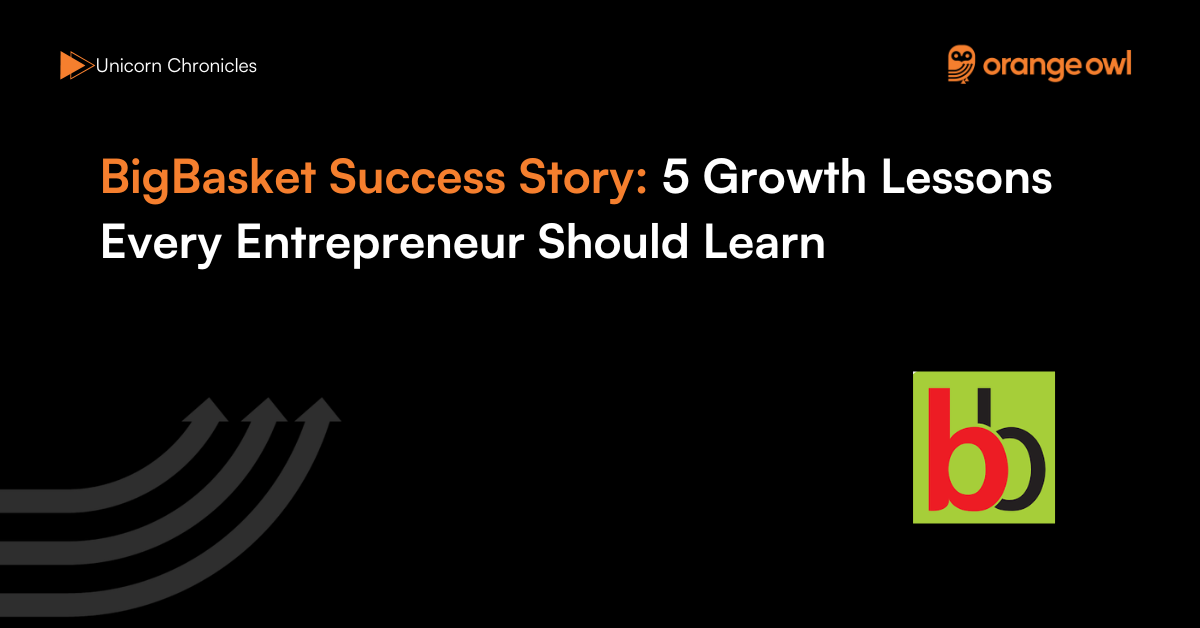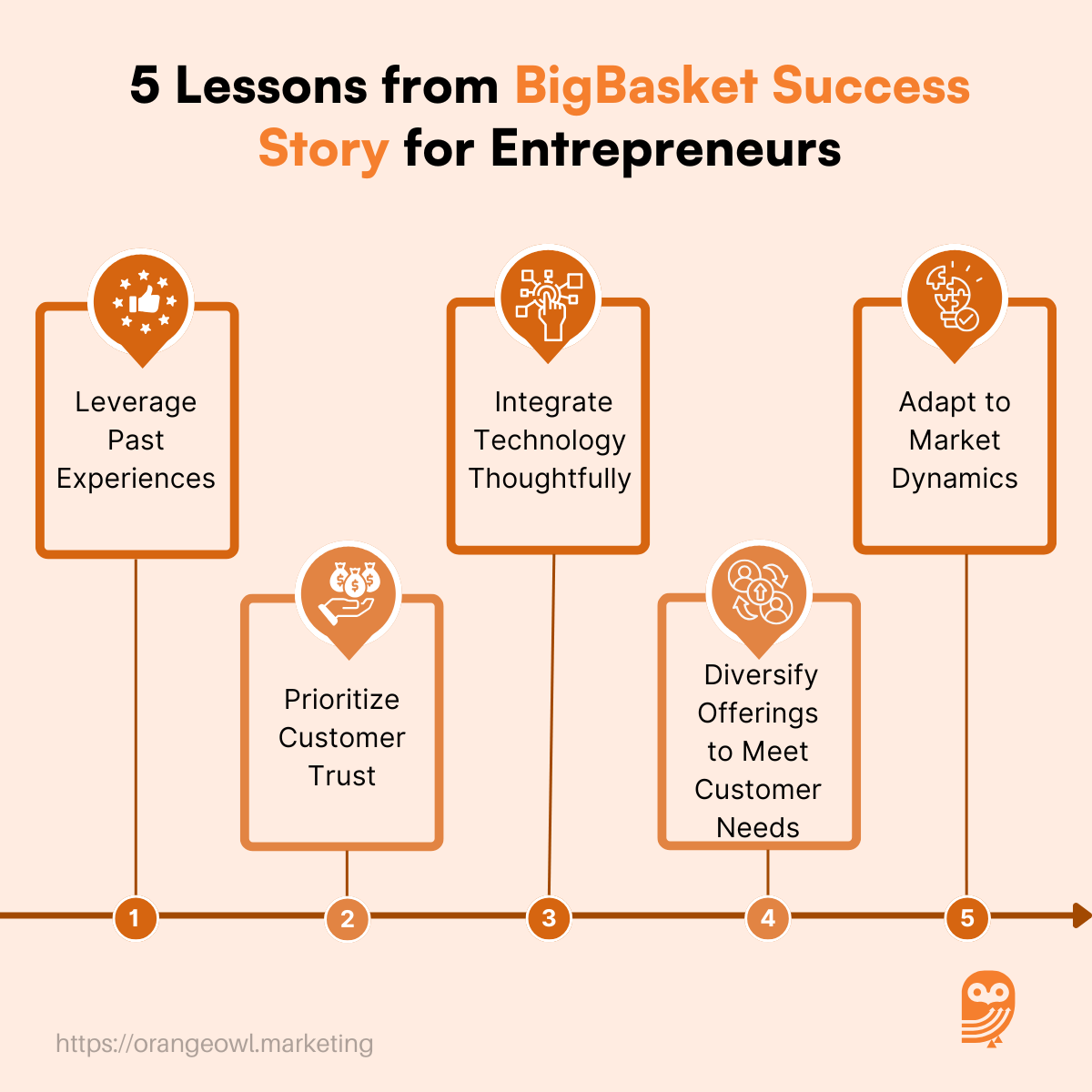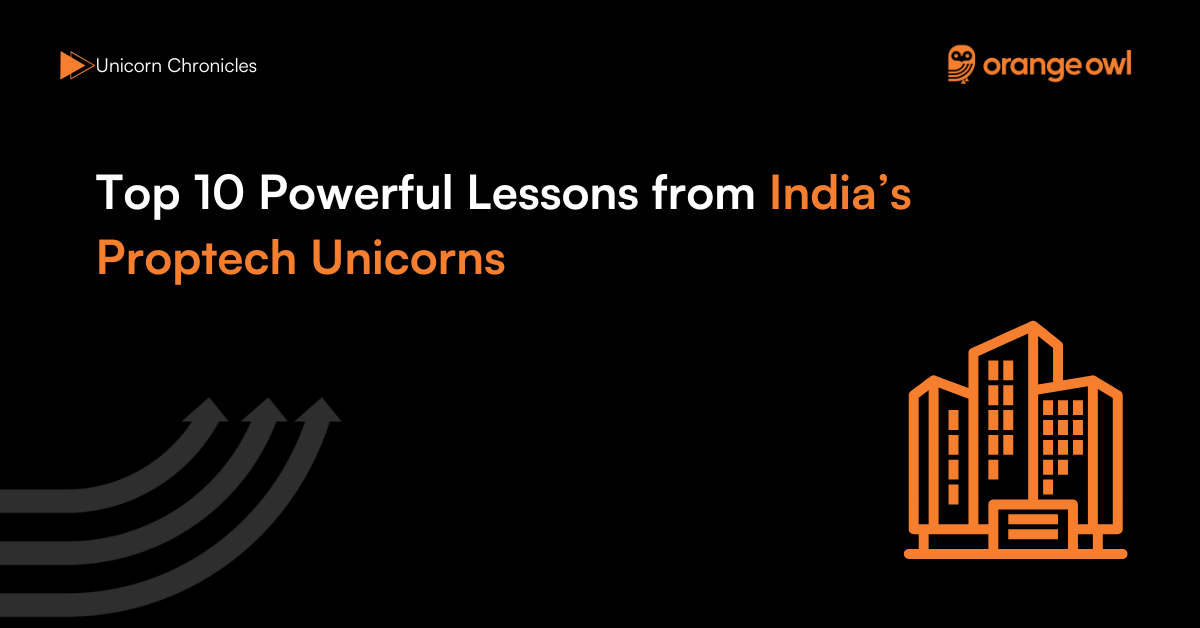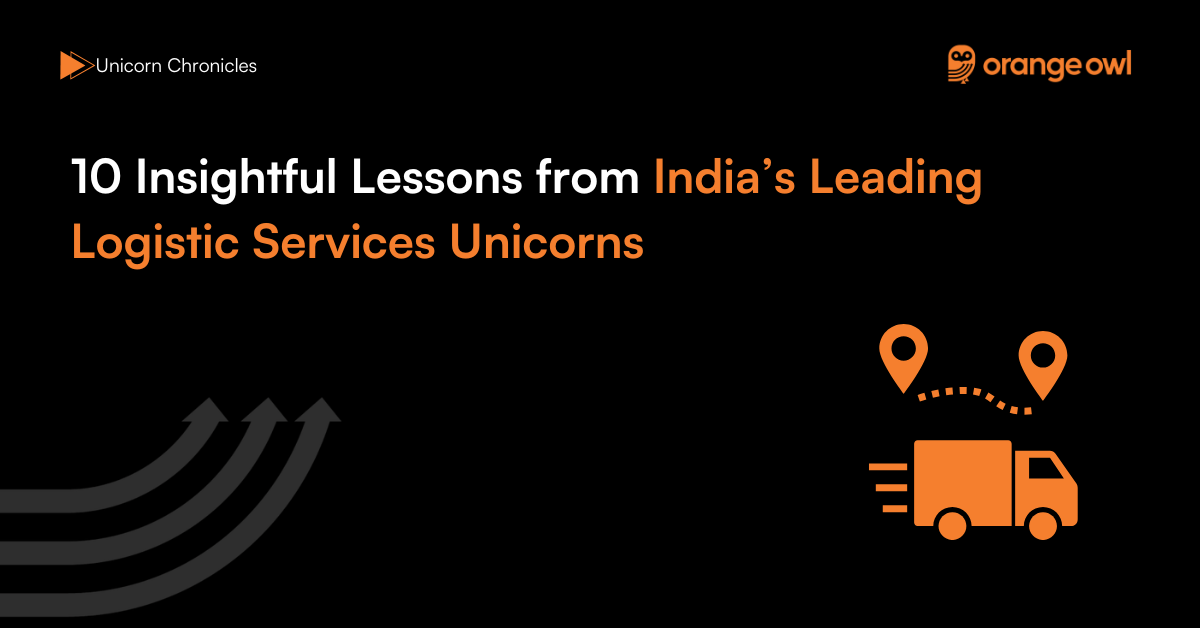BigBasket Success Story: 5 Growth Lessons Every Entrepreneur Should Learn
Vivek Goel
May 20, 2025

Table of Contents
Introduction: Pioneering India’s Online Grocery Revolution
In 2011, a group of seasoned entrepreneurs—Hari Menon, Vipul Parekh, V.S. Sudhakar, V.S. Ramesh, and Abhinay Choudhari—identified a significant gap in India’s retail landscape: the absence of a reliable online grocery delivery service. Drawing from their prior experience with Fabmart.com, one of India’s early e-commerce ventures, they launched BigBasket to address this need. At a time when e-commerce in India was still in its infancy, BigBasket aimed to bring the convenience of online shopping to daily essentials, a category traditionally dominated by local kirana stores.
Over the years, BigBasket has evolved into India’s largest online grocer, operating in over 30 cities and processing approximately 15 million orders monthly. The company’s journey from a startup to a subsidiary of Tata Digital underscores its commitment to innovation, customer satisfaction, and operational excellence.
In the financial year 2023–24 (FY24), BigBasket’s consolidated operating revenue grew by 6% to ₹10,062 crore, up from ₹9,468.5 crore in the previous year. This growth was accompanied by a significant reduction in net losses, which narrowed by 17% to ₹1,415 crore in FY24 from ₹1,785 crore in FY23. The company also reported a gross merchandise value (GMV) of ₹37,355 crore and served 20.76 million transacting customers during the year.
“We saw a massive opportunity in bringing the grocery shopping experience online, focusing on quality, reliability, and convenience.” — Hari Menon, Co-founder & CEO, BigBasket
Origin Story: From Dot-Com Lessons to E-Grocery Leadership
The founding team behind BigBasket—Hari Menon, Vipul Parekh, V.S. Sudhakar, V.S. Ramesh, and Abhinay Choudhari—had already walked the path of e-commerce long before the industry became mainstream in India. Their earlier venture, Fabmart.com, launched in 1999, was among the country’s first online retail platforms, offering everything from books to music and groceries. However, the venture was ahead of its time.
India’s internet infrastructure was still in its infancy, online payment systems were unreliable, and consumer trust in digital transactions was low. Fabmart eventually pivoted into a brick-and-mortar chain, later merging with Trinethra Super Retail, which was acquired by the Aditya Birla Group.
Despite the challenges and eventual exit, the founders walked away with valuable lessons—especially in supply chain optimization, inventory control, and customer relationship management. These insights laid the foundation for their next big idea. By 2011, the landscape had changed dramatically.
Smartphone adoption was rising, internet access had expanded, and urban India was warming up to the convenience of e-commerce. At the same time, traditional grocery shopping remained a highly fragmented and inefficient sector, dominated by local kirana stores with limited product variety, inconsistent pricing, and unpredictable delivery standards.
Sensing a gap—and a massive opportunity—the team regrouped to launch BigBasket, with a bold vision: to digitize India’s grocery experience. Unlike most startups that targeted non-essential categories, BigBasket chose a daily-use vertical that promised both volume and frequency. The idea wasn’t just to sell groceries online, but to build a full-stack, tech-enabled supply chain that would deliver freshness, reliability, and convenience—all on a user-friendly digital platform.
“The biggest advantage we had was that we had done this before. We had already made the mistakes, and now we knew what to do differently.”— Hari Menon, Co-founder & CEO, BigBasket
Business Landscape and Challenges: Redefining Grocery Shopping in India
When BigBasket entered the Indian market in 2011, it was diving into a segment filled with both enormous potential and complex challenges. Grocery shopping in India is deeply ingrained in local culture, with most households relying on neighborhood kirana stores or traditional wet markets.
Fresh produce, in particular, is seen as a tactile purchase—consumers prefer to inspect vegetables, fruits, and dairy in person. Convincing users to trust an online platform with their daily food essentials was a massive behavioral shift.
Beyond customer mindset, infrastructure posed a serious roadblock. Timely deliveries in traffic-congested cities like Bengaluru, Mumbai, and Delhi required advanced logistics capabilities.
Most third-party logistics providers were not equipped to handle perishable items that needed temperature-controlled environments. Add to that the challenge of managing hundreds of SKUs across multiple categories, fluctuating demand, and the need for real-time stock accuracy—it was a logistical puzzle with high stakes.
BigBasket responded with deliberate and long-term investments. The company built dedicated cold storage facilities, established its own fleet of delivery vehicles equipped for perishables, and integrated technology-driven inventory management systems. These systems helped track product freshness, optimize warehouse operations, and ensure on-time deliveries.
More importantly, the brand focused on customer-centric service policies—including flexible delivery slots, subscription models for essentials, and a generous, no-questions-asked return policy. These efforts were aimed not just at solving operational hurdles, but at earning the consumer’s trust, order by order.
“Building trust was paramount. We had to ensure that every order met or exceeded customer expectations to encourage repeat usage.”— Vipul Parekh, Co-founder, BigBasket
Growth Strategies: Combining Technology with Customer-Centric Operations
BigBasket’s meteoric growth was not accidental—it was driven by a clear strategy rooted in technology, operational rigor, and customer empathy. At the heart of their operations was a proprietary supply chain management system that enabled real-time tracking of inventory across warehouses, micro-fulfillment centers, and delivery hubs. This allowed BigBasket to manage demand forecasting, reduce stockouts, and maintain freshness standards even in high-demand categories like fruits, vegetables, and dairy.
One of their most strategic moves was to go direct to source—building relationships with farmers, cooperatives, and producers. This vertical integration cut out multiple intermediaries, reduced spoilage, and allowed better control over pricing and quality. It also aligned with their core promise: fresher produce delivered to the doorstep, often within 24 hours of harvesting.
In a bid to build stronger brand equity and better margins, BigBasket launched private label brands like Fresho, BB Royal, and BB Popular. These labels spanned across fresh produce, staples, personal care, and household items—offering customers premium quality at lower prices and improving BigBasket’s profitability.
The company’s ability to innovate based on customer use-cases also fueled its expansion. Services like BB Daily—a subscription-based model for essentials like milk and bread—and BB Instant—AI-enabled vending machines for quick purchases—helped BigBasket cater to the evolving lifestyles of urban customers. These initiatives not only improved customer convenience but also increased brand touchpoints, making BigBasket a part of the consumer’s daily routine.
“Our focus has always been on leveraging technology to enhance the customer experience, ensuring convenience, reliability, and quality.”— Hari Menon, Co-founder & CEO, BigBasket
Marketing Strategy: Building Trust and Brand Loyalty
In the high-churn world of online commerce, BigBasket knew that loyalty wasn’t just built on discounts—it had to be earned through consistent delivery, transparent policies, and a superior customer experience. Rather than banking on aggressive advertising from the start, BigBasket built its brand slowly and steadily—focusing on customer satisfaction and word-of-mouth referrals as its core growth levers.
The company also invested in content-driven engagement, including recipe blogs, cooking tips, and nutrition guides, which helped it move beyond a transactional brand to a more lifestyle-oriented grocery companion. This approach resonated particularly well with urban homemakers and millennials who were looking for healthier choices and convenience.
To drive retention, BigBasket implemented personalized marketing using deep data analytics. Based on shopping patterns, the platform pushed tailored promotions, replenishment reminders, and bundle offers. These personalized experiences created a stickier relationship with users, increasing repeat purchase rates and basket sizes.
Loyalty programs such as BB Star gave premium customers benefits like free delivery, early access to sales, and exclusive discounts. Additionally, the brand extended its reach through collaborations with local influencers, participation in housing society events, and targeted advertising during festivals and high-demand seasons—making sure the BigBasket name stayed top-of-mind.
“In a business like ours, retention is everything. If you can consistently deliver on quality and timing, customers will stay loyal and even become your advocates.”— Abhinay Choudhari, Co-founder, BigBasket
5 Growth Lessons Every Entrepreneur Should Learn
1. Leverage Past Experiences
The success of BigBasket didn’t emerge in isolation—it was shaped by the founders’ previous experiences with Fabmart.com and other ventures. These early experiments taught them hard lessons about timing, consumer readiness, and operational pitfalls.
Instead of viewing past failures as setbacks, they mined them for insights that became the foundation for BigBasket’s success. This illustrates the power of experience-driven entrepreneurship, where each chapter—whether successful or not—adds to strategic clarity.
2. Prioritize Customer Trust
In a category as sensitive as groceries, where freshness and accuracy directly impact daily life, trust is non-negotiable. BigBasket recognized this early and designed every element of its business—be it return policies, delivery windows, or product quality—around building reliability.
Trust wasn’t built overnight, but through consistent delivery, transparent communication, and responsive customer service, it became a competitive moat. Entrepreneurs must understand that trust is not a metric; it’s a mindset that drives brand loyalty and repeat business.

3. Integrate Technology Thoughtfully
BigBasket’s tech stack was not just a back-end efficiency tool—it was a core enabler of the customer experience. Real-time inventory updates, predictive demand analytics, route optimization for deliveries, and personalized recommendations all stemmed from smart tech integration.
Rather than implementing technology for the sake of innovation, BigBasket used it to solve real problems and scale operations sustainably. The lesson: adopt technology that aligns with your business model and enhances user outcomes.
4. Diversify Offerings to Meet Customer Needs
BigBasket didn’t remain a one-size-fits-all grocery platform. It evolved based on consumer behavior, launching private label brands to offer better value, introducing BB Daily for everyday needs, and experimenting with BB Instant vending machines to serve office-goers and apartment residents.
These expansions were not random—they were strategically aligned to meet emerging customer preferences, deepen engagement, and maximize wallet share. Growth, as shown by BigBasket, often comes from being close to your customer and adapting your offerings accordingly.
5. Adapt to Market Dynamics
The e-grocery market is fluid, influenced by everything from consumer habits to tech disruptions and regulatory shifts. BigBasket demonstrated agility by scaling its warehousing model, shifting marketing approaches, and even tweaking delivery mechanisms in response to on-ground realities.
Whether during the pandemic or festive demand surges, BigBasket adapted quickly while staying true to its core promise. Entrepreneurs must develop this muscle of adaptability, staying alert to changes and responding with agility and intent.
“Adaptability and a relentless focus on customer needs have been central to our journey.”— Hari Menon, Co-founder & CEO, BigBasket
Conclusion: BigBasket’s Blueprint for E-Commerce Success
BigBasket’s evolution from a bold idea in 2011 to India’s largest online grocer is a masterclass in visionary leadership, operational excellence, and customer-first thinking. The company didn’t just build a digital grocery store—it transformed a deeply traditional shopping experience into a seamless, tech-enabled service that millions now rely on daily.
Their journey reflects what it takes to succeed in the Indian startup ecosystem: an unshakable belief in your mission, the patience to build trust, the foresight to leverage technology effectively, and the agility to pivot as needed. BigBasket’s story is not just about selling groceries—it’s about solving a real, recurring problem for Indian households at scale.
For entrepreneurs navigating uncertain terrain, BigBasket offers a robust playbook. Stay close to your customer. Learn fast. Build trust. And above all, don’t be afraid to reimagine legacy industries with modern tools and a human touch.
“Success in e-commerce is not just about technology; it’s about understanding and serving the customer better every day.”— Hari Menon, Co-founder & CEO, BigBasket


